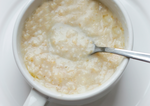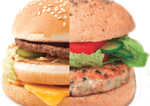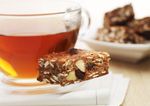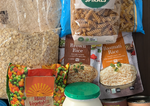Fruit: Why drink it? Just eat it.
by Alison McAleese, LiveLighter Victoria Campaign Manager and Dietitian
- June 25, 2019
- Leave a comment
- VIC
- Families
- Marketing
- Healthy eating
- Top Tips
- Mythbusting
- Sugary drinks
- Shopping
- Fruit and Vegetables
- Industry
- Junk Food
- Sugar
- Smart Swaps
- Nutrition Facts
Ready-to-drink fruit juices may seem like the quick and easy way of getting some fruit into your day. However, we looked beyond the health and nutrition claims plastered on ready-to-drink juice brands and found some companies aren’t delivering the healthy drink they’re promising to consumers.
In fact, our analysis revealed many juices contained high levels of sugar without the goodness of fibre that comes from whole fruit.
Ready-to-drink fruit juices: what the survey found:
- a quarter of products surveyed contained fruit concentrate;
- two thirds of products boasted nutrition and health claims on their packaging;
- products with the highest number of kilojoules per bottle were more likely to contain reconstituted juice;
- all of the brands surveyed exceeded the recommended two pieces of fruit a day.
How does this affect our health?
Beverage manufacturers know that people associate fruit with health, so they play on the promise of a healthy drink by placing statements such as ‘high in vitamin C’ or ‘no artificial colours and flavours’ on packaging to give their product a ‘healthy halo’. This sneaky tactic may prompt consumers to think they’re making a healthy choice when really they’re downing more sugar than they realise.
When people go for these fruit juices instead of a piece of fruit the clear downside is they’re missing out on all the goodness of fibre they would otherwise get from whole fruit. Fibre plays a vital role in stabilising blood sugar levels, maintaining healthy bowels and protecting against diseases such as Type 2 diabetes, heart disease and some cancers.
We know that people are more likely to grab these drinks as a convenient on-the-go option. It may be easy to finish off a 500ml bottle of juice which could contain the equivalent of around four oranges in a few minutes. But imagine eating four oranges in one sitting.
LiveLighter’s top tips on what to drink instead:
- Water and a piece of fruit are a healthier alternative to gulping down fruit juice. You’ll stay hydrated and fuller for longer. Check out our healthier drink recipes - these will leave you feeling satisfied and still give you the sweet hit you’re after.
If you really enjoy fruit juice and want to start slow why not try...
- Limiting your fruit juice hit to half a cup or 125ml and going for the lower sugar variety instead.
- Referring to the product’s ingredients lists and nutrition information panel instead of relying on health claims to guide your choice.
LiveLighter’s analysis of fruit juices:
| Product | Energy (kj) | Fibre (grams per bottle) | Bottle size (ml) | Equivalent number of small apples (92g) (kj) | Equivalent number of small oranges (106g flesh only) (kj) | Contains juice concentrate |
| Original Juice Co. black label (orange juice) | 1275 | <1 | 600 | 6.8 | 6.8 | No |
| Daily Juice Co. apple, watermelon, raspberry | 950 | 0.5 | 500 | 5 | 5 | Yes |
| Coles orange juice | 938 | 2 | 500 | 4.9 | 4.9 | No |
| Daily Juice Co. cloudy apple juice | 925 | 0.5 | 500 | 4.9 | 4.9 | Yes |
| Daily Juice Co. tropical sunshine & fruit juice | 880 | 1 | 500 | 4.7 | 4.7 | Yes |
| Daily juice Co. pulp free orange juice | 835 | 1 | 500 | 4.4 | 4.4 | Yes |
| The Juice Lab coconut breeze | 817 | 2.6 | 350 | 4.3 | 4.3 | No |
| Mildura orange and passionfruit | 815 | Not stated | 500 | 4.3 | 4.3 | Yes |
| Mildura apple and guava | 805 | Not stated | 500 | 4.3 | 4.3 | Yes |
| Mildura orange and mango | 795 | Not stated | 500 | 4.2 | 4.2 | Yes |








